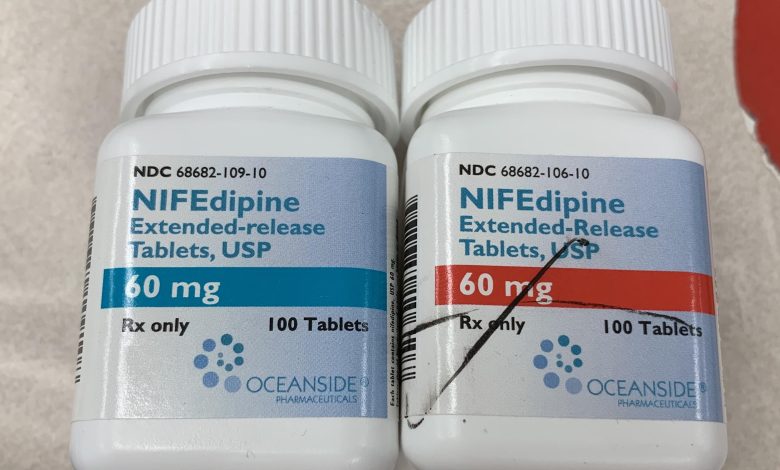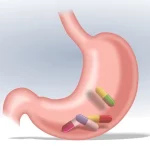Why Take Nifedipine On Empty Stomach? (4 Reasons)

Nifedipine is a medication used primarily to treat high blood pressure (hypertension) and certain types of chest pain known as angina. It belongs to a class of drugs called calcium channel blockers, which work by relaxing and widening blood vessels, allowing for easier blood flow.
Nifedipine blocks the entry of calcium into smooth muscle cells in blood vessels and the heart. This action helps to relax and widen the blood vessels, reducing blood pressure and relieving angina symptoms.
Nifedipine is commonly prescribed for the treatment of high blood pressure. By reducing blood pressure, it helps to lower the risk of complications associated with hypertension, such as heart attacks, strokes, and kidney problems.
Nifedipine is also used to treat angina, a type of chest pain caused by insufficient blood flow to the heart muscles. By dilating the coronary arteries, it increases blood supply to the heart, relieving angina symptoms like chest discomfort or pressure.
How is Nifedipine Taken
Nifedipine is available in various forms, including immediate-release tablets, extended-release tablets, and capsules. The specific form prescribed depends on the condition being treated and the individual patient’s needs.
The dosage of nifedipine can also vary depending on the specific condition being treated, individual patient factors, and the formulation of the medication. It is essential to follow the prescribed dosage provided by your healthcare provider. The following dosage information is general and may not apply to every situation. Always consult with your doctor or pharmacist for personalized dosage recommendations.
For hypertension (high blood pressure):
• Immediate-release tablets: The typical starting dose is 10 mg to 20 mg, taken orally three times a day. Your doctor may adjust the dose based on your response. The maximum recommended daily dose is usually 120 mg.
• Extended-release tablets: The usual starting dose is 30 mg to 60 mg, taken orally once a day. The dose may be increased gradually, usually at 7 to 14-day intervals. The maximum recommended daily dose is usually 90 mg.
For stable angina (chest pain):
• Immediate-release tablets: The usual starting dose is 10 mg to 20 mg, taken orally three times a day. Your doctor may adjust the dose based on your response. The maximum recommended daily dose is usually 180 mg.
• Extended-release tablets: The typical starting dose is 30 mg to 60 mg, taken orally once a day. The dose may be increased gradually, usually at 7 to 14-day intervals. The maximum recommended daily dose is usually 120 mg.
It’s important to note that these dosages are general guidelines, and individual dosing may vary. Your doctor will determine the most appropriate dose for you based on your medical condition, response to treatment, and other factors.
Always follow your healthcare provider’s instructions and do not adjust your dosage without consulting them first. They will consider your specific situation and any other medications you may be taking to ensure the safe and effective use of nifedipine.
Why take nifedipine on an empty stomach?
Nifedipine is commonly recommended to be taken on an empty stomach because food can affect its absorption and effectiveness. Here are a few reasons why it is often advised to take nifedipine on an empty stomach:
1. Absorption: Nifedipine is a drug that is sensitive to food interactions. Food, particularly high-fat meals, can slow down the absorption of nifedipine, leading to delayed onset of action and reduced effectiveness. Taking it on an empty stomach ensures optimal absorption and allows the medication to reach therapeutic levels more quickly.
2. Avoiding interactions: Certain foods, especially those rich in fat, can interfere with the metabolism of nifedipine in the liver. By taking it on an empty stomach, you reduce the likelihood of potential interactions that could alter its metabolism or decrease its effectiveness.
3. Consistency: Taking nifedipine consistently on an empty stomach helps maintain a stable blood concentration of the medication. Consistency in dosing enhances its efficacy and helps ensure that you receive the intended therapeutic benefits.
However, it’s important to note that specific instructions for taking nifedipine may vary depending on the formulation and brand. Always follow the instructions provided by your healthcare provider or the medication label. If you have any doubts or questions about when or how to take your nifedipine, consult with your doctor or pharmacist for personalized guidance.
What happens if I take Nifedipine with food?
Taking nifedipine with food, especially meals that are high in fat, can affect its absorption and may alter its effectiveness. Here’s what may happen if you take nifedipine with food:
1. Delayed onset of action: Food, particularly high-fat meals, can slow down the absorption of nifedipine from the gastrointestinal tract. This delay in absorption may result in a slower onset of action, meaning it may take longer for the medication to start working and provide the desired therapeutic effects.
2. Reduced effectiveness: Food interactions can decrease the bioavailability of nifedipine, which refers to the amount of the medication that enters the bloodstream and is available for therapeutic action. When nifedipine is taken with food, especially high-fat meals, the absorption of the medication may be reduced, leading to lower blood concentrations and potentially decreased effectiveness in lowering blood pressure or relieving angina symptoms.
3. Increased side effects: Nifedipine is generally well-tolerated, but taking it with food, particularly high-fat meals, may increase the risk of certain side effects. For example, the medication’s vasodilatory effects may be enhanced, leading to a higher likelihood of experiencing side effects like dizziness, flushing, or low blood pressure.
While taking nifedipine with food occasionally may not cause significant harm, it is generally recommended to take it on an empty stomach to ensure optimal absorption and effectiveness. However, it’s important to follow the specific instructions provided by your healthcare provider or the medication label. If you have any concerns or questions about taking nifedipine with or without food, it is best to consult with your doctor or pharmacist for personalized advice.





